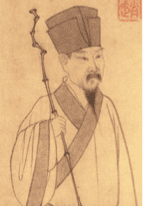According to Matthew Ciolek’s Zen Buddhist Calendar today is the birthday of Su Tung-p’o. The listing noted he was an esteemed if controversial bureaucrat, lay Buddhist practitioner, and poet. I thought that interesting enough to look a bit further.
Wikipedia says Professor Ciolek’s dates are wrong, marking his birth as the 8th of January in 1037 and his death on 24 August 1101. Nonetheless I’m happy as a clam to have been introduced, or perhaps better re-introduced to someone I was only tangental aware of through something Dogen wrote, someone who has been called the “pre-eminent personality of the eleventh century.” It should be noted, according to Wikipedia, the renowned Hangzhou dish Dongpo pork is named for him.
Su Dongpo made his living as a government official, serving in various capacities. What he really was, was a poet, essayist, and artist. Oh, and there’s that Buddhist thing. Apparently his poetry caused him to lose his governmental positions more than once. The Poetry Foundation provides an example of why this might be (in Arthur Waley’s translation).
Families when a child is born
Hope it will turn out intelligent.
I, through intelligence
Having wrecked my whole life,
Only hope that the baby will prove
Ignorant and stupid.
Then he’ll be happy all his days
And grow into a cabinet minister.
He was born into the literate classes, as a child he was tutored by a Daoist priest, and clearly had a command of the Confucian classics, receiving the jinshi degree from the civil service exams. After a brief imprisonment and then during one period of exile Dongpo took up Buddhist practice.
My colleague the Reverend Dr Victoria Weinstein tells a story about him in a sermon she wrote:
“Su Dongpo was an avid student of Buddhist teachings. He was quick-witted and humorous; as a Zen Buddhism follower he was very serious and self-disciplined. He often discussed Buddhism with his [master], Zen Master Foyin. The two lived across the river from one another… One day, Su Dongpo felt inspired and wrote the following poem:
“I bow my head to the heaven within heaven
Hairline rays illuminating the universe
The eight winds cannot move me
Sitting still upon the purple golden lotus
“The ‘eight winds’ in the poem referred to praise, ridicule, honor, disgrace, gain, loss, pleasure and misery – interpersonal forces of the material world that drive and influence the hearts of men. Su Dongpo was saying that he has attained a higher level of spirituality, where these forces no longer affect him.
“Impressed by himself, Su Dongpo sent a servant to hand-carry this poem to Foyin. He was sure that [the master] would be equally impressed. When Foyin read the poem, he immediately saw that it was both a tribute to the Buddha and a declaration of spiritual refinement. Smiling, the Zen Master wrote “fart” on the manuscript and had it returned to Su Dongpo.
“Su Dongpo was expecting compliments and a seal of approval. When he saw “fart” written on the manuscript, he was shocked . He burst into anger: “How dare he insult me like this? Why that lousy old monk! He’s got a lot of explaining to do!”
“Full of indignation, he rushed out of his house and ordered a boat to ferry him to the other shore as quickly as possible. He wanted to find Foyin and demand an apology. However, Foyin’s door closed. On the door was a piece of paper, for Su Dongpo. The paper had following two lines:
“The eight winds cannot move me
One fart blows me across the river.”
In a traditional Zen story this is where the poet would have his great realization.
And, who knows? Maybe.
What I do learn from digging into what followed is that he turned ever more deeply into the great matter, and in time came to be considered one of the truly wise. His poetry would be explored on several occasions, as I noted earlier, by no less a figure than Eihei Dogen. Of these most notably the poem as Gary Snyder felicitously renders it, “Valley Sounds, Mountain Colors.” This is his genuine “enlightenment poem.”
Valley sounds are the long, broad tongue.
Mountain colors are no other than the unconditioned body.
Eight-four thousand verses are heard through the night.
What I can I say about this in the future.
Dogen couldn’t have praised this poem more highly, declaring of its writer “he studied the way of dragons and elephants in the ocean of awakening. He descended deep chasms and soared freely through the clouds.”
Capturing that as well as the spirit of Zen Buddhism, one of his poems would come to be considered a classic summation of that spirit. The poem is titled Remembrance. It’s the one I treasure…
To what can our life on earth be likened?
To a flock of geese,
alighting on the snow.
Sometimes leaving a trace of their passage.
I loved the image of being blown across the river by a fart. Such a lovely image for a person of Zen. But honestly, its this poem of geese, and that sometimes trace that captures the whole of the mystery…
For another angle…
And a fairly nonBuddhist recipe…













